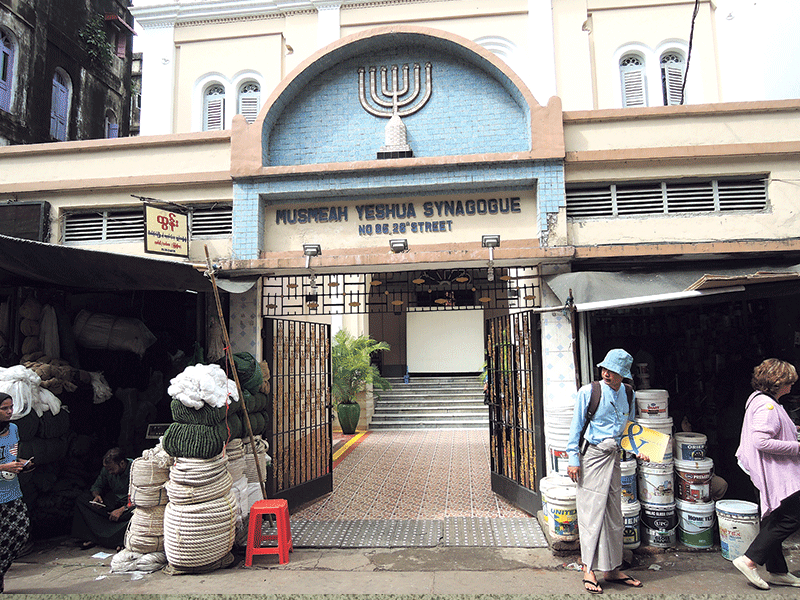This country is in a constant state of flux. Though still widely called Burma, its official name has been Myanmar since the late 1980s. The capital was Rangoon, now called Yangon. A decade ago, with no warning or consultation, the government moved the capital 300 kilometres north to Naypyidaw, halfway to Mandalay.
Myanmar is emerging, gingerly, from decades of harsh military rule. Last November’s elections resulted in a landslide win for Nobel Peace Prize winner Aung San Suu Kyi, who spent 15 years under house arrest by order of the junta. The whole nation, it seems, is holding its breath about the upcoming scheduled handover of power. If it fails, it’s feared the generals will be back.
But an overall sense of optimism prevails and tourism is up thanks to a new openness.
READ: WOMEN-ONLY ISRAEL TOUR NAMED AFTER DIAMANT BESTSELLER
The sole constant in this complex, gentle land is religion, a profound Buddhism. The skyline of Yangon is dominated by the sumptuous, gold-dome Shwedagon Pagoda, the most sacred Buddhist site in the country and always packed with worshippers who drop and pray pretty much anywhere along a tiled promenade of shrines and chapels.
Another stable institution can be found in Yangon’s insanely cacophonous downtown neighbourhood of Pabedan, which is mainly Indian and Muslim. At number 85 on 26th Street, tucked between a paint store and an open-air shop bulging with rope and webbing, one finds the Musmeah Yeshua Synagogue, Myanmar’s sole Jewish congregation.
Built by Baghdadi merchants who migrated here in the 19th century, later augmented by Cochin Jews from India who traded in teak, the small wooden structure burned down in 1854 and was re-opened in 1893 on this spot. After visiting over a dozen Buddhist monasteries, shrines and pagodas in various states of disrepair, it was a pleasure to walk into the spotless synagogue’s sanctuary.
We were told that the caretaker, who was mopping the floor the day we visited, and the guard at the door, are Muslim.
READ: SAVANNAH BOASTS THE ONLY GOTHIC SHUL IN NORTH AMERICA
The Jewish population in Rangoon peaked at 3,000 and Jews dealt in textiles and timber. The community was so well-regarded that Rangoon and the smaller city of Pathein had Jewish mayors.
But when Japan invaded and conquered Burma in 1942, things came to a halt. Regarded by the new wartime overlords as spies for the British, Jews fled to Australia and India. Any remnants left when the Burmese army took power in 1962.
At one point, there were 126 Torah scrolls stored in the shul. Today, there are two, encased in beautiful Iraqi-style filigreed silver capsules.
We are warmly greeted by a smiling Sammy Samuels, a 35-year-old business graduate of Yeshiva University in New York and community spokesman. Sammy took the helm from his famous father, Moses, who served as caretaker and trustee for decades before his death last year at age 65 (on display under glass are letters of condolences, including one from the government of Canada).
Samuels notes that the core community today consists of 20 people, all citizens of Myanmar, but that a wider Jewish group of visiting academics, diplomats, students and ex-pats may number up to 120.
There’s a minyan Friday nights, depending on how many foreigners show up. Samuels says a rabbi visits from New York for High Holiday services.
The synagogue’s airy two-level interior is marked by chandeliers, white pillars, a central bimah, lots of red velvet, and sturdy teak pews with woven rattan seats and backs. The whole affair is a colonial relic.

Prayer is still in the Sephardi style. Funds are raised mainly by donations. There’s a Jewish cemetery holding 700 graves on 91st Street but we didn’t make it there.
Interfaith relations are good, Samuels reports, with Christian schoolchildren visiting regularly. He lowers his voice when he tells me that there’s growing tensions between Buddhists and Muslims. “This is something the government will have to face,” he adds.
Burma and Israel achieved independence the same year, 1948. Blown-up photos in the sanctuary show a 1961 state visit here by founding Israeli prime minister David Ben-Gurion wearing full Burmese dress, and by former foreign minister Abba Eban in 1967. Burmese leaders also visited Israel.
Relations with Israel are good, Samuels says, with plenty of agricultural know-how being imported.
Under military rule, there was only a trickle of foreign visitors, he says. But now, dozens arrive every week, including many from Israel. In fact, TripAdvisor touts the synagogue in its Top 10 things to see in Yangon.
Samuels beams when he describes Chanukah here. “Oh, it’s amazing. Jews, Buddhists, Hindus, Muslims, Christians and Baha’is all sit in one room participating in a Jewish holiday. It’s a miracle.”
